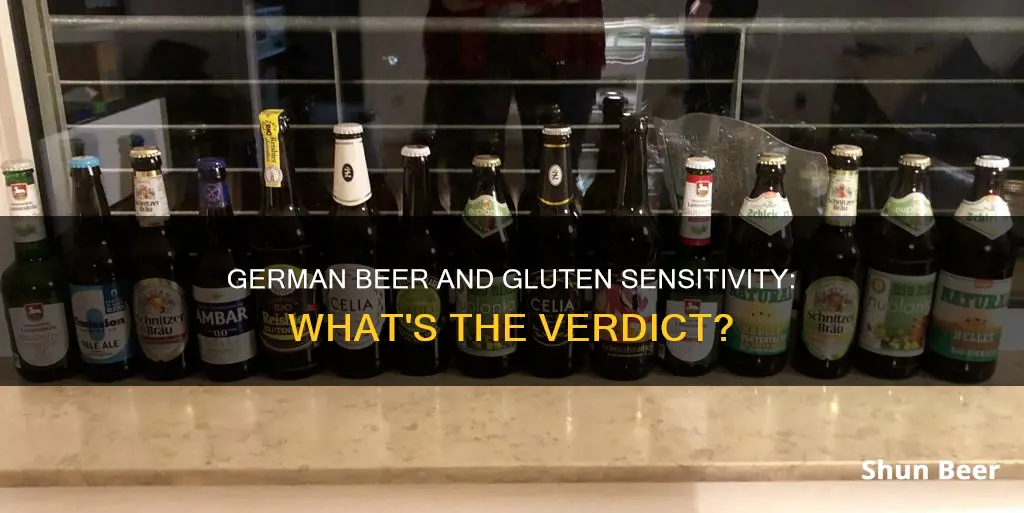
Beer is traditionally made with barley, hops, yeast, and sometimes wheat. Since barley and wheat contain gluten, conventional beer is not gluten-free and is not recommended for people who are gluten intolerant or on a gluten-free diet. However, there are now many gluten-free beers on the market, which are made with grains that don't contain gluten, such as sorghum, quinoa, and buckwheat. Some beers are also gluten-removed, meaning they are made with gluten-containing grains but the gluten is removed in production, although some fragments may remain. While these may be suitable for people with gluten sensitivity, experts recommend that those with celiac disease avoid gluten-removed beers and stick to beers that are labelled gluten-free.
| Characteristics | Values |
|---|---|
| People with gluten sensitivity able to drink German beer? | It depends on the type of beer and the severity of the sensitivity. |
| Gluten content in German beer | Varies depending on the type of beer and brewing method. |
| Beer brewed according to German Purity Law | Made from hops, malt, yeast, and water. The malt can be made from barley, wheat, or rye, which contain gluten. |
| Wheat beer | Highest gluten content, with around 250 mg of gluten per liter. |
| Pilsner lager | Lowest gluten content, with about 1.2 mg of gluten per liter. |
| Light full beer | Contains about 2.7 mg of gluten per liter. |
| Dark full-bodied beer | Contains around 4.6 mg of gluten per liter. |
| Non-alcoholic or malt beer | Contain more gluten than Pilsner lager, with approximately 3.2-3.3 mg of gluten per liter. |
| "Gluten-free" beer | May still contain up to 20 mg of gluten per liter according to EU food law. |
| Gluten-removed beer | Not recommended for people with celiac disease as it may still contain gluten fragments. |
| Gluten-free alternatives | Hard ciders, wine, pure distilled liquors, and beverages made from fermented fruit juices. |
What You'll Learn

German beer and gluten sensitivity symptoms
German beer, like most beers, is traditionally made with barley, hops, yeast, and sometimes wheat. Since barley and wheat contain gluten, beer is not gluten-free and is typically off-limits to those with celiac disease or gluten sensitivity.
The gluten content in beer can vary greatly depending on the type of beer, the brewing method, and the grains used. Wheat beers, for example, tend to have the highest gluten content, while Pilsner lagers have the lowest.
For individuals with celiac disease, even commercially available German beers are likely to contain too much gluten. However, for those with non-celiac gluten sensitivity, the gluten content of different beers can make a significant difference in their ability to tolerate them. Some beers, such as Pilsner lagers, have a very low gluten content and may be tolerated in small amounts by some gluten-sensitive individuals.
It is important to note that the term "gluten-free" on beer labels has specific regulations. In the EU, for example, a beer labeled "gluten-free" may still contain up to 20 mg of gluten per kg, which could be enough to trigger symptoms in individuals with gluten sensitivity. Therefore, it is recommended that gluten-sensitive individuals take precautions, such as consuming gluten-free or low-gluten beers and taking supplements like GluteoStop, to reduce their exposure to residual gluten.
Symptoms of gluten sensitivity can vary but are similar to those of celiac disease, which include iron-deficiency anemia and an itchy skin rash (dermatitis herpetiformis). When individuals with gluten sensitivity remove gluten from their diet, these symptoms typically subside.
Beer Drinking on Guadalupe River: What's Allowed?
You may want to see also

Gluten-free German beers
People with gluten sensitivity or celiac disease should generally avoid drinking conventional beer, as it is typically made with gluten-containing ingredients like barley and wheat. However, there are now many gluten-free and low-gluten beers available, including some German options.
- Riedenburger Brauhaus offers a gluten-free beer exclusively brewed from millet called Riedenburger Gluten Frei.
- Lammsbräu Glutenfrei is a gluten-free beer from Germany.
- Neumarkter Lammsbräu offers a gluten-free, non-alcoholic beer.
- Storch Im Glück Bio-Pilsner Glutenfrei is a gluten-free pilsner from Brauerei Schleicher.
- German Hirse Premium is a gluten-free beer from Schnitzer Bräu. They also offer a lemon version.
- Bitburger Helles Lagerbier is a gluten-free, full-bodied lager from Bitburger Braugruppe.
Other Gluten-Free Beers
In addition to German options, there are several other gluten-free beers available from breweries around the world:
- Anheuser-Busch Redbridge
- Brasserie Dupont Forêt Libre
- Brasseurs Sans Gluten Glutenberg Blanche
- Brunehaut Bio Ambrée and Brunehaut Blonde Bio
- Burning Brothers Brewing
- Dogfish Head Craft Brewed Ales: Tweason'ale
- Drummond Gluten Free
- Epic Brewing Company: Glutenator
- Glutenberg American Pale Ale, Belgian Double, and India Pale Ale
- Green's Discovery Amber Ale, Enterprise Dry-Hopped Lager, India Pale Ale, and Quest Tripel Blonde Ale
- Ground Breaker Corsa Rose Gold Ale, IPA No. 5, and Dark Ale
- Ipswich Ale Brewery: Celia Saison
- Joseph James Brewing Fox Tail
- Lakefront New Grist Ginger Style Ale and Pilsner Style
- Minhas Lazy Mutt Gluten Free
- Mongozo Premium Pilsener
- New Planet Belgian Style Ale, Blonde Ale, Raspberry Ale, and Seclusion IPA
- Nickel Brook Gluten Free
- Nouvelle France La Messagère, La Messagère Aux Fruits, and La Messagère Red Ale
- Omission: Lager and Pale Ale
- Sprecher Brewing Company's Shakparo Ale
- Steadfast Beer gluten-free Blonde and Pale Ales, and Oatmeal Cream Stout
- To Øl Reparationsbajer Gluten Free
- Aurochs Brewing - Aurochs Blonde Ale
- Bard's Tale - The Original Sorghum Malt Beer
- Bierly Brewing - Felix Pilsner
- Blueprint Brewery Company - For the Love of Amber
- Burning Brothers Brewing - Cranberry Shandy
- Coors Peak Copper Lager
- Departed Soles Brewing Company - A Dark Night
- Evasion Brewing - Hoptensity Dipa
- Ghostfish Brewing Company - Grapefruit IPA
- Hambleton's Ale: GFA and GFL
- Holidaily Brewing - Fat Randy's IPA
- Moonshrimp Brewing - One Small Step
- O'Brien Brewing: Lager and Brown Ale
- St. Peters Brewery: G-Free
- Silly Yak Foods Aztek Gold Pale Ale
- Whistler Brewing Company - Forager Lager
- Wold Top: Against the Grain
Low-Gluten Beers
It is important to note that people with celiac disease should only drink beers labelled as gluten-free. However, for those with a gluten sensitivity, there are some low-gluten beers that may be tolerable in small amounts. Pilsner lager (Pilsener Urtyp) has a very low gluten content of about 1.2 milligrams per liter, and light full beer contains around 2.7 milligrams of gluten per liter.
Energy and Alcohol: Do Beer and Red Bull Work?
You may want to see also

German beers with low gluten content
People with a gluten sensitivity or intolerance should be cautious when consuming beer, as most beers contain gluten. Hops are gluten-free, but wheat and barley, which are often used in the beer-making process, contain copious amounts of gluten. According to EU food law, a beer labelled "gluten-free" may still contain up to 20 mg of gluten per kg, which may be enough to cause issues for those with a gluten sensitivity.
However, there are some German beers with low gluten content that may be suitable for those with a gluten sensitivity. Here are some options:
- Riedenburger Brauhaus Riedenburger Glutenfrei: This gluten-free beer is brewed exclusively from millet and contains natural, organic, and non-genetically modified ingredients.
- Lammsbräu Glutenfrei: This gluten-free beer is suitable for those with celiac disease, with a golden yellow colour, a moderately sweet taste, and a slightly bitter finish.
- Bitburger Helles Lagerbier - glutenfrei: This full-bodied, hoppy beer has a gluten content of 5.1% ABV. The gluten is removed using a special method, resulting in a tasty beer even without gluten.
- Brauerei Schleicher Storch Im Glück Bio-Pilsner Glutenfrei: This gluten-free pilsner has a rating of 3.17 out of 5 stars.
- Schnitzer Bräu German Hirse Premium: This organic gluten-free beer is made from millet and has a rating of 2.53 out of 5 stars.
It is important to note that the gluten content in beer can vary greatly depending on the type of beer and the brewing method. Pilsner lager (Pilsener Urtyp) typically has the lowest gluten content, with about 1.2 milligrams of gluten per liter, while wheat beer has the highest gluten content, with around 250 milligrams of gluten per liter.
Drinking Non-Alcoholic Beer While on Probation: Is It Allowed?
You may want to see also

German beers to avoid with gluten sensitivity
People with gluten sensitivity or celiac disease should be cautious when consuming beer, as it is typically made with gluten-containing grains like barley and wheat. While some beers are made with low amounts of barley or gluten-free grains, most German beers are not gluten-free and should be avoided by those with gluten sensitivity.
The German Beer Purity Law (Reinheitsgebot) of 1516 stated that the only ingredients allowed in beer production were water, barley, and hops, which presents an issue for those with gluten sensitivity or celiac disease. While this law is no longer in effect, many German beers still adhere to these traditional ingredients, making them unsuitable for those with gluten sensitivities.
Wheat beer, a popular style in Germany, has the highest gluten content among beer styles, with about 250 milligrams of gluten per liter. This is far above the threshold for a beer to be considered gluten-free, which is less than 20 parts per million (ppm) or 20 mg per kg of gluten. Therefore, wheat beers are not an option for those with gluten sensitivity.
Other German beer styles that typically contain gluten include dark full-bodied beers, non-alcoholic beers, and malt beers. These styles can have varying levels of gluten, but they are not considered safe for those with celiac disease or gluten sensitivity.
Some German breweries have started to offer gluten-free options, but these can be more expensive and may not be easily accessible. It's important to read labels carefully and look for the "gluten-free" label, which is indicated by a crossed-out ear of corn. Even then, according to EU food law, these beers can still contain up to 20 mg of gluten per kg, which may be enough to trigger a response in those with gluten sensitivity.
In summary, individuals with gluten sensitivity or celiac disease should generally avoid German beers, as most of them contain gluten. While there may be some low-gluten options available, it is crucial to carefully read labels and understand the potential risks before consuming any beer.
Drinking Beer in Your Car: Driveway Legalities Explained
You may want to see also

German beers and celiac disease
German beers, like most beers, are typically made from a combination of malted barley and hops, and sometimes wheat. Since barley and wheat contain gluten, beers made from either are not gluten-free. This means that conventional German beers are not suitable for people with celiac disease or gluten sensitivity.
However, it is important to note that the gluten content in beer can vary greatly depending on the type of beer and the brewing method used. For example, Pilsner lager (Pilsener Urtyp) has a very low gluten content of about 1.2 milligrams per liter, while wheat beer (which is popular in Bavaria) has a much higher gluten content of around 250 milligrams per liter. This means that some German beers may be tolerated in small amounts by individuals with gluten sensitivity, but it is important to check the gluten content before consuming.
For individuals with celiac disease, the current consensus is that gluten-removed beers are not yet safe for consumption. These beers are made with grains that contain gluten, and while the gluten is removed during production, some fragments may remain. According to EU food law, a beer labeled "gluten-free" may still contain up to 20 mg of gluten per kg, which could be enough to trigger celiac disease. Therefore, it is recommended that individuals with celiac disease avoid German beers that are not labeled gluten-free.
There are now some German beer suppliers whose products are marked with a crossed-out ear of corn, indicating that they contain less than 20 mg of gluten per kg. However, even these beers may not be safe for individuals with celiac disease, and it is always important to read labels carefully and consult with a healthcare professional if unsure.
Beer and Glimepiride: Is It Safe to Drink?
You may want to see also
Frequently asked questions
Beer is traditionally made with barley, hops, yeast, and sometimes wheat. Since barley and wheat contain gluten, beers made from either are not gluten-free. However, there are beers on the market that are made without gluten, using gluten-free grains like sorghum, rice, corn, millet, or buckwheat. These beers are generally safe for people with gluten sensitivity.
German beer, brewed according to the German Purity Law, is made from hops, malt, yeast, and water. The malt can be made from a variety of grains, including barley, wheat, and rye, which contain gluten. Therefore, German beer is not typically safe for people with gluten sensitivity. However, some German beers may have lower gluten content than others, and there may be gluten-free options available.
The threshold for gluten-free products is 20 parts per million (ppm) or 20 mg per kg of gluten. This is the lowest amount of gluten that can be detected with available scientific tools. People with gluten sensitivity may be able to tolerate small amounts of gluten below this threshold. However, it is important to note that individual tolerance levels may vary, and some people with gluten sensitivity may need to avoid gluten completely.







